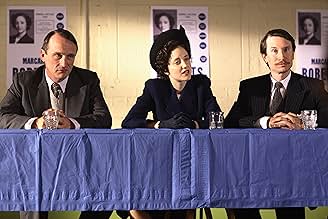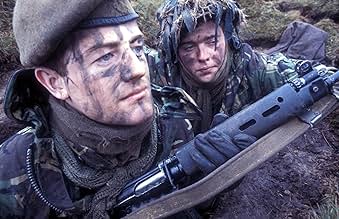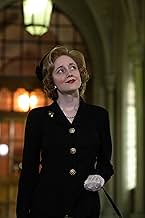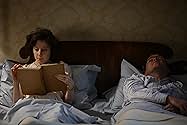Ajouter une intrigue dans votre langueOn April 2, 1982, Britain went to war to regain the Falkland Islands. This movie is a gripping account of how Prime Minister Rt Hon Margaret Thatcher MP's government handled the biggest cris... Tout lireOn April 2, 1982, Britain went to war to regain the Falkland Islands. This movie is a gripping account of how Prime Minister Rt Hon Margaret Thatcher MP's government handled the biggest crisis in British foreign affairs since the Suez Canal. It tells the story of how Argentina, a... Tout lireOn April 2, 1982, Britain went to war to regain the Falkland Islands. This movie is a gripping account of how Prime Minister Rt Hon Margaret Thatcher MP's government handled the biggest crisis in British foreign affairs since the Suez Canal. It tells the story of how Argentina, an ally of the British, fought the Conservative government and invaded the Falklands. This ... Tout lire
Histoire
Le saviez-vous
- AnecdotesOriginally commissioned by the BBC in 1987, but wasn't filmed until 2002.
- GaffesAdmiral Lewin is wearing the South Atlantic Medal. Before the war had even begun.
- Citations
Alexander Haig: We are trying to de-escalise a war.
Margaret Thatcher: So am I. But you do not do it by appeasement. You increase its chances. You see this table? This was where Neville Chamberlain sat in 1938 when he spoke on the wireless about the Czechs as "far away people about whom we know nothing and with whom we have so little in common". Munich! Appeasement! A world war followed because of that irresponsible, woolly-minded, indecisive, slip-shod attitude and the deaths of 45 million people.
Tom Enders: The fact that we have to treat Britain and Argentina even-handedly for the purpose of negotiation...
Margaret Thatcher: How *dare* you treat us even-handedly? Argentina is the aggressor, the invader. A fourth-rate, cruel, unstable, corrupt, brutal regime with no morals or scruples whatever! They torture and murder their political opponents by the most ghastly Nazi methods. And this is the regime you wish to give even a foothold over British citizens?
- Crédits fousThe first names of Nicholas Ridley and Jeanne Kirkpatrick were mis-spelled as Nicolas and Jeane in the closing credits.
- ConnexionsFeatured in When TV Goes to War (2011)
As noted by a reviewer above, Thatcher's political position was very weak at the time. She was seen by the country and many of her "wet" cabinet ministers as being a right wing liability who would sink the Tories at the next election because she had worsened, not improved, Britain's economy. Unemployment had sky-rocketed.
The decision to withdraw HMS Endeavour from the South Atlantic (the supply ship for the Falklands) was made by her right wing Defence Minister John Nott on grounds of cost- cutting. Both the Foreign Office under Carrington and I believe the Chiefs of Staff and the Intelligence Services opposed it on the grounds that the Argentinians would interpret the withdrawal as a sign that the UK was not serious about maintaining its Falklands colony and this would greatly encourage them to invade. Thatcher overruled them and backed Nott. She therefore had direct responsibility for this mistaken decision and should, on the Argentinian invasion, have resigned.
This was known at the time of the Saturday House of Commons debate by many people, especially on the Conservative back benches. There was great unease on them, and talk of replacing her. What saved her probably was Michael Foot's highly patriotic support of her in his speech and the fact that the debate only lasted 4 hours rather than the more usual 8. (Clever work probably by the Whips). If it had been 8, it is very likely that this unease about Thatcher would have surfaced from both wets and right wingers who suspected she was an incompetent woman who had blundered into a war.
Then, had she been replaced - probably by a wet ("wets" by and large were of an older generation than the supporters of Thatcher and had fought in the 2nd War and would have been thought "reliable" to fight another war) - the war would have gone ahead, Britain would again probably have won, and a "wet" rather than Thatcher would have been in charge of Britain and subsequent history would have been radically different. But it is through ironies like this that history operates. As it was, it was those who had been originally been right on "Endeavour" who were forced to resign like Carrington, and Thatcher, the British politician (along with Nott) most responsible for allowing the war to break out, the person who went on to be lionised as a great Churchillian war leader.
The Saturday Commons debate was the great turning point. Curteis presents the debate falsely as a straight patriotic piece of Churchillian stiff upper-lip tub thumping. (This is understandable, the Left had been and was caricaturing Thatcher mercilessly in their propaganda and Curteis's play is his right-wing propaganda blast back). But it would have been far more interesting - and dramatic - to go for neither villains or heroes, but what history really consists of - human beings. And by showing complexities and ironies, rather than pieties and propaganda.






















